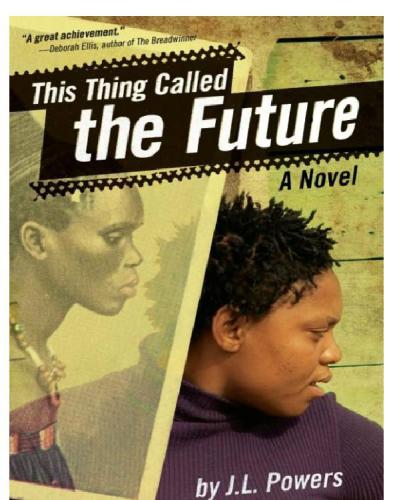
This Thing Called the Future
فرمت کتاب
ebook
تاریخ انتشار
2011
Lexile Score
710
Reading Level
3
ATOS
4.5
Interest Level
9-12(UG)
نویسنده
J.L. Powersناشر
Cinco Puntos Pressشابک
9781935955108
کتاب های مرتبط
- اطلاعات
- نقد و بررسی
- دیدگاه کاربران
نقد و بررسی

March 21, 2011
For 14-year-old Khosi, life has become far more complicated than she would like. She lives with her mother, her grandmother "Gogo," and her younger sister, Zi, in a Zulu shantytown in South Africa, where conditions are dismal: no one has money, and there are weekly funerals for AIDS victims. On top of everything, a neighbor accuses her mother (who becomes violently ill) of stealing, and Khosi's developing body is drawing unwanted attention, particularly from a drunken neighborhood man who attacks Khosi on multiple occasions. Despite her circumstances, Khosi is resilient; her passions are science and her unshakable connection to the spirit world. "Science is important," she reflects. "So are the old ways. But because they are so stubborn, it makes it really difficult to navigate a path between them to be my own person." Through the eyes of a conflicted teenager, Powers (The Confessional) composes a compelling, often harrowing portrait of a struggling country, where old beliefs and rituals still have power, but can't erase the problems of the present. Readers will be fully invested in Khosi's efforts to secure a better future. Ages 13â17.

April 15, 2011
Set in an impoverished South African shantytown where post-Apartheid freedom is overshadowed by rampant AIDS and intractable poverty, this novel takes a loving, clear-eyed look at the clash of old and new through the experience of one appealing teenager. Khosi, 14, lives in an all-female household with her sister, Zi, and frail grandmother, Gogo, subsisting on Gogo's pension and Mama's salary as a teacher in the city (she comes home on weekends). Everyone in Khosi's world is poor. Where the struggle to survive is all-consuming, family loyalty trumps community. Clashes between Zulu customs and contemporary values further erode cultural ties and divide families. A scholarship student, Khosi loves science, but getting to school means dodging gangs and rapists hunting AIDS-free virgins. After a witch curses Khosi's family and Mama falls ill, Khosi and Gogo seek aid from a traditional Zulu healer, which Mama dismisses as superstition while fear and poverty keep her from accessing modern medicine. As stresses mount, Khosi's ancestors speak, offering her guidance. Supported by them, her family and classmate Little Man, Khosi vows to create a better future by synthesizing old and new ways, yet the obstacles she faces—some inherited, others newly acquired—are staggering. A compassionate and moving window on a harsh world. (glossary of Zulu words) (Paranormal fiction. 12 & up)
(COPYRIGHT (2011) KIRKUS REVIEWS/NIELSEN BUSINESS MEDIA, INC. ALL RIGHTS RESERVED.)

May 1, 2011
Gr 9 Up-Khosi, a 14-year-old living in post-apartheid South Africa, is torn between her grandmother's superstitious beliefs in witches and sangomas (healers) and her mother's Western belief in science and medicine. She lives in a shantytown in Pietermaritzburg with Gogo and her younger sister while their mother works in another city and comes home on the weekends. At school, Khosi earns top marks in biology, but she wonders how she can balance science, Zulu ancestral beliefs, and religion (the family is Catholic) when they seem to contradict one another. Everywhere Khosi looks, from billboards to the frequent local funerals, she sees evidence of "the disease of these days" (HIV/AIDS). When her mother returns home ill, Khosi is torn between shame brought upon her family and trying to figure out what is wrong with her. Has the neighbor put a curse on her family? Does her mother have the disease, and, if so, does that mean Khosi's distant father gave it to her? Khosi's dreams torment her and seem to turn into reality, causing her to question her possible future as a sangoma. The stark reality facing South Africa's population is delineated with heart-wrenching honesty. This is a powerfully gripping, eye-opening novel that doesn't pull any punches, and readers will long remember Khosi and the trials and tribulations facing South Africans as they venture forth into the modern world while desperately holding onto their heritage.-Michele Shaw, Quail Run Elementary School, San Ramon, CA
Copyright 2011 School Library Journal, LLC Used with permission.

June 1, 2011
Grades 10-1 Apartheid may be over, but for Khosi Zulu, 14, growing up in a slum near Pietermaritzburg, the daily struggle continues with poverty, crime, and the spreading plague of HIV/AIDS. She has a scholarship to a good school and a nice boyfriend, who is a fellow classmate, but a drunk man is stalking her in the dark streets, and a furious neighbor accuses Khosi's mother of theft, even while Mama lies dying. Grandmother (Gogo) tells Khosi to listen to the ancestors who speak to her in her dreams. But Mama wants her daughter to be a modern Zulu girl; science and Christianity are the answer, not superstition. Can Khosi reconcile it all? Powers, who has spent a lot of time in South Africa and speaks Zulu, captures the local conflicts as well as the universal coming-of-age themes. Teens will sympathize with Khosi's weariness at hearing about her parents' heroic role in the past struggle, and the tense story builds skillfully to an anguished revelation readers will want to discuss.(Reprinted with permission of Booklist, copyright 2011, American Library Association.)

























دیدگاه کاربران